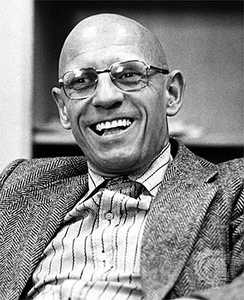Roland Barthes
"The death of the Author is the Birth of the Reader" Barthes
Roland Barthes questioned the orthodox meaning of author. Traditionally author means to create text or piece of work, however Barthes identifies a flaw in this definition. Authors draw on previous texts and conventions in order to create new pieces of text. Barthes also coined the term "author-god", meaning to limit interpretation of the text. The absence of an "author-god" frees up interpretation. Roland Barthes quoted "The death of the author is the birth of the reader".
Meaning of a piece of text depends on the readers impressions and experiences, not the writers, he then refers to the author as more of a scriptor; to create the text but not the meaning. "A text's unity lies not in its origon, but in its destination [author]".
"To give a text and author is to impose a limit on that text" Roland Barthes

Foucaults definition and critisism of the 'Author Function'
- Foucault argues the term author is used to assign responsibility for those who publish contraversial or socially unacceptable statements.
-the author tends to be more recognised when referring to a piece of literary text, more so than factual texts.
- Foucault suggested that the author can be more of a narrator. The narrator being the alter ego of the actual writer.
-Foucault agrees with Barthes' interpretation of authorship not being directly in control of meaning.
Definition of the Author Function- Author existing to create the structure of a piece of text, not to define the interpretation. Foucault even elaborates on this to suggest that knowing the author (and thus knowing the authors intentions for the meaning of the text) biases the readers interpretation of the text.
Michel Foucault
Definitions of Authorship